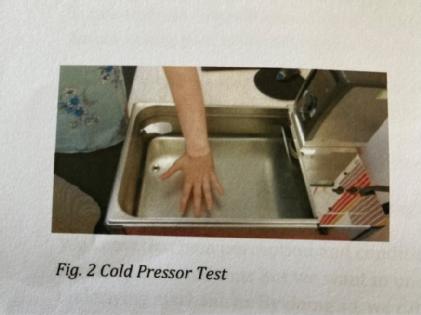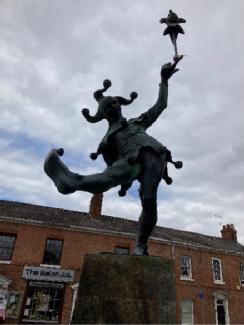WITHIN Blog: July 2022
Research Visit to Warwick Sleep & Pain Lab
Thank you, Sleep and Pain lab!
by Anke Samulowitz, University of Gothenburg
26/07/2022
The EUTOPIA Doctoral mobility program allowed me to visit the Sleep and Pain Laboratory at the University of Warwick this summer and I’m most grateful for this opportunity. What could be better for a pain researcher to talk to other pain researchers for three weeks and observe their work closely? Well, to do that and to meet interesting, welcoming and wonderful people at the same time!
I’m a PhD-student from Sweden and my thesis is about associations between chronic pain, gender norms, and psychological and social factors like social support and self-efficacy (an individual’s belief in her/his ability to handle challenges in life). The WITHIN-study explores mental defeat (a perceived loss of autonomy and dignity). Obviously, we had a shared interest in discussing how individuals react to chronic pain and handle it. I have mainly studied attributes that may help to manage pain, like social support and self-efficacy, but, of course, I wanted to know more about the other end of the spectrum as well. Are self-efficacy and mental defeat two different sides of the same coin? Not really, it’s always more complicated than you might think.
We had long discussions about mental defeat and how it relates to other feelings and mind-sets, like pain catastrophizing (distressing thinking about pain), self-esteem, self-compassion, victorious thoughts, acceptance, self-criticism, confidence, trust, feelings of guilt, shame, happiness, and relief… Having been preoccupied by statistics lately, it was very useful to go back and think about what it all means, as a personal experience. One of the lessons I learned is how important it is to study how psychological attributes and time tie in. When does an event that affects you psychologically become a stable part of your personality? Or when does a psychological reaction, triggered by a specific event just go over? And, based on my own research area, is this different for men, women and gender diverse people? And if so, is it driven by biological differences or by gendered upbringings and different expectations we have towards men and women?
We had those discussions in one-by-one chats but also during a much-appreciated joined lunch.

To conduct experimental research is not part of my PhD-studies but I have, of course, read articles based on pain experiments. For instance, I read about experiments showing that women are more sensitive to pain than men. In other studies men’s and women’s sensitivity to pain could be altered by gendered expectations. For a summary of both kinds of experiments, see Fillingim et al., 2009. The opportunity to pilot one of the studies helped my understanding a lot; to experience what it is like to be the participant, to dip the hand into that icy water and to try to remember a memory related to defeat. It was also a good reminder that part of being a researcher is to think about your own preunderstanding and (life)stance.

Photo from the WITHIN – Participant Info Sheet (v5.4)
We shared common ground as well, for example the use of different pain-related questionnaires. We exchanged experiences and talked about the strengths and challenges of statistics. I’m also deeply impressed about the enormous amount of dedicated and rigorous work that the members of the Sleep and Pain lab have invested in their research, which has led to a treasury of intriguing data. Hopefully, I will be be involved in a little piece of that work. We have started to plan for a joined research project, based on narratives collected by the lab. If everything works out, we will combine our strengths and explore individuals’ experiences of mental defeat and add a gender perspective to the analysis. I hope that involves me coming back next year 😊
It would have been easy to become all caught up with research, but my wonderful lab-mates made sure I wouldn’t miss the beautiful Midlands of England.








Photos: Anke Samulowitz
Research is a lifelong journey and my three weeks travel to the Sleep and Pain lab certainly gave me new insights, knowledge and ideas for my future research.
I wish to thank the EUTOPIA Doctoral mobility program and all of you: Kristy, Jenna, Paige, Toria and Arman! And special thanks to Nicole for inviting and welcoming me to the lab!
If you want to read more about my research project, click here.

Written by Anke Samulowitz, PhD Candidate at the University of Gothenburg School of Public Health and Community Medicine.
Glossary:
- EUTOPIA Doctoral mobility program - supports PhD students enrolled in a doctoral programme of one of the EUTOPIA universities and wishing to conduct a research visit at another EUTOPIA university.
- Gender norms – ideas about how women and men should be and act. Internalised in early life, gender norms can establish a life cycle of gender socialisation and stereotyping (EIGE, 2016)
- Self-efficacy – an individuals belief in his or her capacity to execute behaviours. It reflects confidence in the ability to have control over one’s own motivation, behaviour and social environment (Bandura, 1988, 1986, 1997)
- Mental defeat – applied to the context of chronic pain, this can be explained as a loss of identity and self in relation to repeated episodes of pain (Tang, 2010; 2007)
- Pain catastrophizing – a negative response to actual or anticipated painful experiences (Sullivan et al., 2001)
- Self-esteem – belief and confidence in your own ability and value (Cambride Dictionary)
- Self-compassion – being kind and caring to oneself in the face of pain or failure (Neff, 2013)
- Psychological attributes – an emergent property of individuals within their social interactions
- Pain experiments – an example of this is the Cold Pressor Test and Algometer test for pressure pain, which are standard ways of safely testing pain threshold responses.
References:
Fillingim R.B., King C.D., Ribeiro-Dasilva M.C., Rahim-Williams B., Riley III, J.L. (2009). Sex, gender and pain: A review of recent clinical and experimental findings. The Journal of Pain, 10(5),447-485
